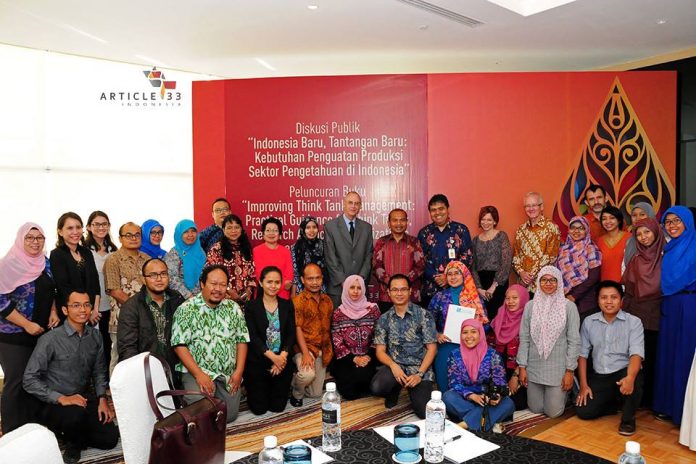As a country undergoing vast economic development, Indonesia is now facing a big problem in producing good quality public policies due to the country’s low investment in the knowledge sector. From 1996 to 2008, Indonesia has only produced 9,194 scientific papers. That is 13 years behind countries such as Bangladesh, Kenya, Lithuania and Nigeria. It is also far behind compared to its neighboring countries such as Thailand, Malaysia and Singapore.
In 2014, Indonesia’s national budget for research was only Rp. 12 trillion or 0.09%. It is far below Thailand (0.25%), Malaysia (1%), and Singapore (2.6%). Based on the data from Social Science Citation Index (SSCI), Indonesia’s production of scientific papers on social knowledge published in international peer-reviewed journals adds up to only 12%-or half–of what Thailand and Malaysia publish.
Research shows how production in Indonesia’s knowledge sector is stagnant due to regulation problems. These problems include: the complicated procurement process for research projects, the absence of a checks-and-balances system that can assure regulation to be supported with sufficient proof, and low incentive for research and researchers.
As we enter a new era of government emerging from the 2014 Election, Article 33 Indonesia together with Results for Development Institute (R4D) organized a Public Discussion entitled “New Indonesia, New Challenges: Demand for Strengthening the Knowledge Sector Initiative in the Policy Making Process in Indonesia.” The discussion addressed the challenges of evidence-based policy in Indonesia and the essential tasks to be done by responsible parties in terms of knowledge production. It also analyzed the new government’s commitment to improve the knowledge production sector, especially President Joko Widodo’s governmental promises in Nawa Cita and the slogan ’the country is here’.
Minister of National Development Planning/Chief of Bappenas, Dr. Andrinof A. Chaniago, M.Si served as Key Speaker on the theme ‘Strengthening the production process of Evidence-based Public Policy.’ Other panelists include: Dr. Yanuar Nugroho (Deputy II of Priority Program Assessment and Management, Presidential Staff Office of the RI), Raymond J. Struyk (Senior Fellow, Result for Development Institute, author of the book Managing Think Tanks), Fred Carden (Knowledge Sector Initiative DFAT Australia) and Chitra Retna S. (Executive Director of Article 33 Indonesia).
A special part of the event was the launch of Raymond J. Struyk’s new book, “Improving Think Tank Management: Practical Guidance for Think Tanks, Research Advocacy Organizations and Their Funders”. The book is the outcome of extensive research of management practices at over 80 think tanks worldwide. “Experience shows that better managed think tanks tend to be more successful in influencing policy because of stronger research and better engagement with policy makers, ” said Dr. Struyk.
The book aims to provide practical guidance to Indonesia’s think tanks and research advocacy NGOs on improving the management quality of their organizations so they are better prepared to take advantage of new opportunities. “The state’s role is essential in institutionalizing the practice of making knowledge the base of policy making, This includes funding support, regulating research procurement and sparking public discourse. On the other hand, to be able to guard public policy in the long term, true sustainability for a think tank can only be achieved if it has good management,” said Chitra.
http://www.r4d.org/improving-think-tank-management

